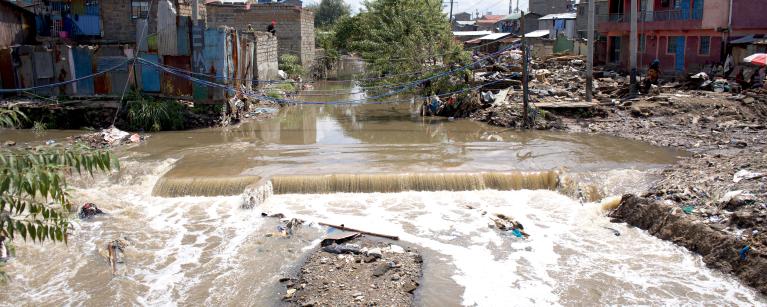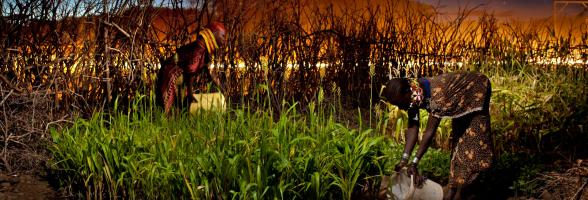Floods, like other natural disasters, profoundly disrupt the lives of those affected. While the extent of the impact may vary, many individuals and households experience significant setbacks, with life and livelihoods rarely returning to normal. In March, April, and May, Kenya endured heavy rainfall, leading to widespread flooding across the country. Households in informal settlements were among the hardest hit, particularly following government-led demolitions of homes deemed to be on riparian land. Many residents were unable to salvage substantial belongings, compounding their vulnerability.
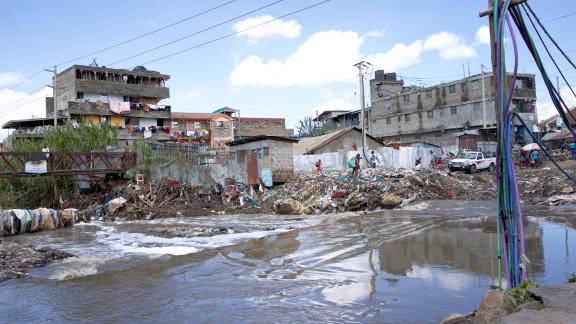
A flowing Nairobi River. It bursts its banks during heavy rains and floods nearby houses. Photo by Misheck Macharia/Oxfam.
Kibagare Slum
In collaboration with Family is Family, a Community-Based Organization working in Nairobi's Kibagare informal settlement, Oxfam in Kenya, with the funding from the Scottish Government provided Non-Food Items such as pads, washing soap, basins, undergarments, water treatment and cash transfer of KSh.7,000 for up to 2 months in response to the floods. A total of 1,950 households were affected by floods in this slum where 30 houses were swept away. The homes of Maria, Joyce and Weremasia are among the 395 households that found some relief through this partnership.
“When the water started getting into the house, it was at night. I did not even think of checking the time. My brother helped me evacuate. I lost my plates, cooking pots, flour, food I had cooked and all the omena I was meant to sell the following day.”
Maria, 77, received the cash transfer for 2 months and has since moved to a small house by the roadside. She now lives there and sells food stuff just outside her home.
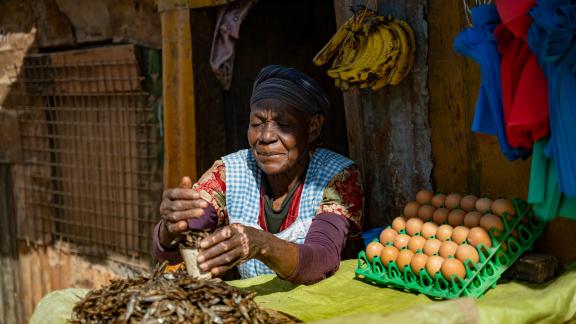
Maria Otieno, selling foodstuff outside her house in Kibagare. Photo by Oxfam.
Further up the road from Maria, lives 69-year-old Weremasia Osebe. The mother of three and grandmother to four moved here after the house they lived in was demolished soon after flooding started. Apart from being an elderly person, Weremasia was diagnosed with diabetes almost 2 years ago and was admitted for a year at the Kenyatta National Hospital. Her leg was amputated from the knee downwards as a result of the illness and although she got a prosthetic leg, her movement is still laboured, and she relies on crutches for support.
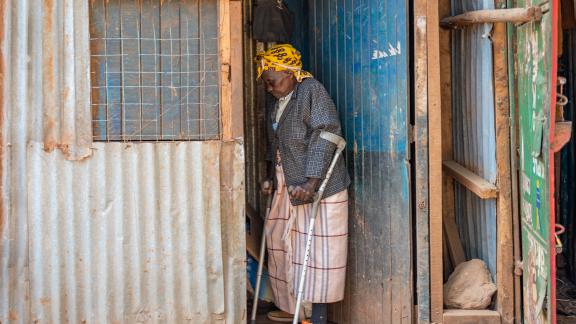
Weremasia Osebe on crutches at her house in Kibagare. Photo by Oxfam.
''That night when the floods came into my house, I was woken up by the sound of utensils in the rushing water. It was midnight. My grandchildren had visited that day and were fast asleep. I woke them up quickly and we huddled together on my bed until morning. Plates and cooking pots were swept away by the water, and we remained with the bed, suitcases, and our lives. We were afraid because we knew people had died like this. I moved twice and finally found a house by the road, not too far from the gate into Kibagare.'' narrates Weremasia.
Before the illness, Weremasia used to sell vegetables at the Kangemi market, and her business was doing very well. She continued to do so albeit in smaller scale just outside her house until the floods set her back and she had to recalibrate. With the cash transfer from Oxfam, Weremasia, restocked vegetables and she strictly sells the same food stuff the doctors recommend for her diet so that she can cook some of it on days she does not sell everything. These include butternut squash/butternut pumpkin, potatoes, bell pepper, ginger, garlic, onions, tomatoes, bananas, and thorn melon.
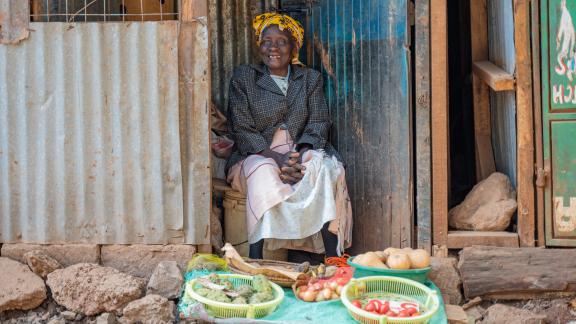
Weremasia Osebe selling foodstuff outside her house in Kibagare. Photo by Oxfam.
“That night when the floods came into my house, I was woken up by the sound of utensils in the rushing water. It was midnight. My grandchildren had visited that day and were fast asleep. I woke them up quickly and we huddled together on my bed until morning. Plates and cooking pots were swept away by the water, and we remained with the bed, suitcases, and our lives. We were afraid because we knew people had died like this. I moved twice and finally found a house by the road, not too far from the gate into Kibagare.”
Joyce Nyarangi Oyugi
36-year-old Joyce attests to life before the floods being tough because as a single mother of 4, she bears all the responsibility for her family. Life after the floods became particularly harder for her as she lost all her belongings including her phone, children’s uniforms, mattresses, and books. She had to rely on her friends for help until Francis of Family is Family and his team reached out to her to offer support in the form of Non-Food Items (NFIs) and an unconditional cash assistance.
“I cried in gratitude for the assistance I received. I bought food, tools for my cleaning work (basins and soap) and took my children back to school, recalls Joyce.
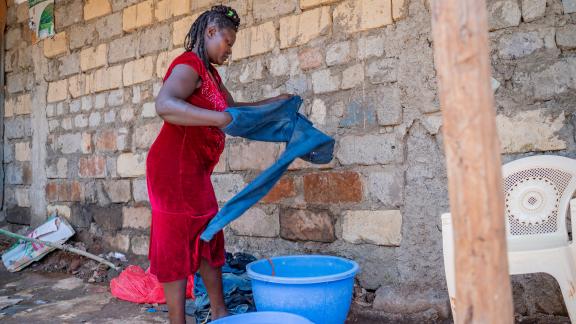
Joyce Nyangi doing laundry in Kibagare. Photo by Oxfam.
“When it started raining, the landlord came and demolished the house we were living in out of her own accord, and I had to find another place to live. I was not ready for this. My vegetable stall was part of the structure. That is when I started washing clothes for people to earn a living. Moving out of this slum was not an option for me. I had no Idea where I would go and survive with my four girls. Life here is affordable and I am surrounded by people who know me.”
Rising from the waters with the Scottish-funded project for Nrb's floods-affected communities
How communities are rebuilding their livelihoods with the Scottish-funded project for the Nairobi's floods-affected communities
